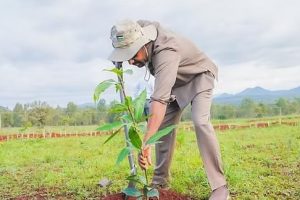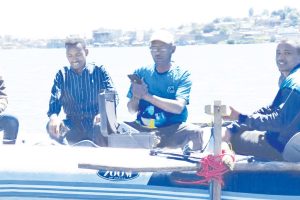
Drought is causing food and fodder shortages and putting the lives of people at risk. It has also forced the community to leave their residences in search of food and water when their livestock is died and affected. Hence, the provision of clean, and safe water during a drought time is crucial for drinking, cooking, and hygiene.
Reduced rainfall due to climate change, coupled with population pressure, deforestation, and change in land use are major factors in the increasing risk of drought in Ethiopia. Drought, since recurrent drought is common in East Africa, currently, has occurred and impacts some parts of the country.
The National Disaster Risk Management Commission, Public Relations Director Debebe Zewde told local media that, in recent months, due to the lack of rain in some parts of the Somalia and Oromia regions, many people are at risk of severe drought. Especially, 9 zones in the Somalia region are now at risk of drought, adding that more than 2.4 million people are in need of assistance, he added.
Taking this fact into consideration, the government, the regional states, the city administrations, individuals, stakeholders, and partners have been providing humanitarian assistance through cash and in-kind to drought-affected areas in the Somalia region. In Borena Zone, fodder for the castles, water tankers, containers, medical supplies, food to the affected people to reduce the damage caused by the drought, and so on has been provided. Nonetheless, much work remains to be done.
According to Disaster Risk Management Commission Commissioner Mitiku Kassa, in order to minimize the negative impact of the drought, various activities have been done. Especially, the support and emergency response mechanism are under implementation in line with the decisions and directions of the national committee.
Nonetheless, the complexity of the problems and inadequate support from partners has been creating negative impacts on the support and response endeavors to drought-affected areas, he said.
Prime Minister Abiy Ahmed, together with high-level delegations has visited one of the drought-affected areas in the Somalia region. During the visit, Prime Minister Abiy Ahmed (Ph.D.) said that, “currently we are facing a severe drought in some parts of the county. In addition to the problem which is caused by terrorist TPLF group in the northern part of Ethiopia, there are also people who are displaced by the drought.”
Although the severity of the drought is different from previous years, and many cattle have been hurt and died, there is no loss of human life so far. This is a good thing for us. The government, in the future, in order to reduce the damage that was happened to the cattle and to reverse the situation, is ready to work with the people to find a solution to the drought, he noted.
Since drought requires quick responses, in fact, the discussion and collaboration tasks are significant to give swift responses to the people who are affected by the drought. Hence, the move of the Prime Minister is a key stepping stone to ascertain the solutions. Apart from the role of the government, the solidarity and togetherness of the people during adversity is imperative to curb the negative impact of the drought.
The local elders of the Borena Zone have called on the communities to overcome the effects of the drought by supporting each other. Local Elder Borbor Bulle said that the people of the Borena Zone have a tradition known as “Busa Gonofa” which is essential to help one another during difficulties.
The tradition has been inherited from our ancestors, and so the people should continue to reverse the negative impact of the drought that occurs in the Zone. Assisting one another and working hard is important to overcome the current drought, he said.
It is true that the current drought, which is happening in the country, requires an all-rounded and inclusive kind of response. It is also significant to redouble the efforts since the victims of the drought need various types of support.
According to the victims of the drought, “in the past, our lives depended on the cattle we have, but now, we are unable to sell or eat the cattle because of the drought that has occurred in the region. Accordingly, we need more support than ever before. We need everything that a living person needs.”
Of course, the government and other partners have been supporting the drought-affected areas of the country. The government has also disclosed its readiness to provide various supports in collaboration with others stakeholders and concerned bodies. These efforts have significantly contributed to preventing the drought from turning into a famine.
Reports indicated that the drought has affected some parts of Somalia and the Oromia regions. So far, 6.4 million people have been impacted by the drought across the nation, 2.5 of which are in Somalia and more than 8,000 in Oromia. However, the drought hasn’t caused any death in the country, but it is a major cause of the death of the cattle.
Somalia Regional State President Mustafa Mohammed noted that since the beginning of the drought, no human lives have been lost as government and non-government organizations have provided water, fodder, and other assistance for those people who are affected by the drought.
Nevertheless, many cattle have lost their lives as they could not cope with the dry weather condition. Thus, various activities are being carried out to solve the problem sustainably with special emphasis on improving water use and management, he said.
Oromia Disaster Risk and Development, Disaster Management Commission Commissioner Mustafa Kedir told the Ethiopian Herald that due to lack of rain, more than 800,000 people have been affected by the drought in eight zones of southeastern Oromia.
Accordingly, the government has taken various measures to address the problem. So far, 197,896 quintals of food grains have been distributed to the drought-affected Borena zone. Besides, a total of 507,151 bell grass and 96 water points have been provided to solve the problem of fodder to the Zone, he added.
As stated by Prime Minister Abiy Ahmed (Ph.D.), “we will scale the provision of water trucks, food, fodder, and medicines, while we accelerate the small dams’ projects we have embarked upon to support water management in lowland areas, as a pathway to circumventing future droughts.”
The government’s central focus is on preventing citizens from dying as a result of the drought. “If we work together and scale up our efforts, we will overcome this problem as we overwhelmed other problems together,” he underlined.
Studies have recommended that building drought resilience communities, coordinating the health and education systems, closely following up climate change, ensuring development, and bringing economic growth are keys to firmly standing the effect of drought.
Accordingly, the efforts and commitment of the government to protect the citizens from dying in drought deserve appreciation. In the further, it is important to strengthen disaster readiness and response capabilities at local and national levels through reducing reliance on climate-sensitive income activities, introducing better seeds and agricultural technologies.
BY EPHREM ANDARGACHEW
THE ETHIOPIAN HERALD SUNDAY EDITION 30 JANUARY 2022





